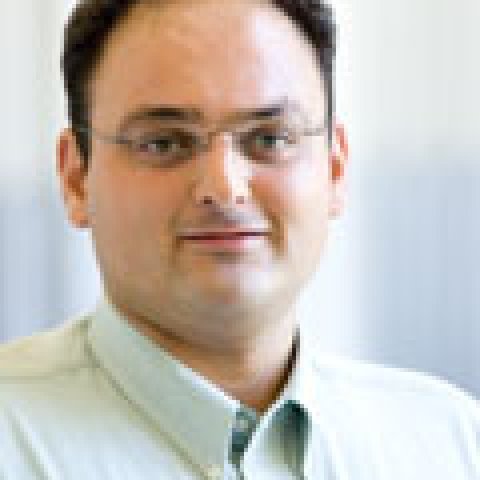Marwan M Kraidy
Fellow
Professional Affiliation
Assistant Professor of International Relations and International Communication, School of International Service, American University
Expert Bio
Growing up in Lebanon, I witnessed firsthand the advent of the Arab information revolution and the ensuing shifts in inter-Arab and Arab-Western relations. In 1994 I began researching the cultural implications of this phenomenon for my Ph.D. dissertation, using ethnographic fieldwork and television criticism to understand young people's interaction with global, regional and local popular culture in Lebanon. Since then, I have been developing an interdisciplinary approach using a multilingual literature (Arabic, French and Spanish in addition to English) to analyze the role of media and popular culture in intercultural and international relations.The intermingling of people and media from different cultures is a communication-based phenomenon known as hybridity. Drawing on original research from Lebanon to Mexico and analyzing the use of the term since the first century AD, my book Hybridity, or the Cultural Logic of Globalization offers readers a history of the idea and a set of prescriptions for its future use. The book's case studies build an argument for understanding the importance of the dynamics of communication, uneven power relationships, and political economy as well as culture, in intercultural relations. It develops a new framework to study cultural mixture-—called critical transculturalism—-which provides a practical method for examining how media and communication work in international contexts. Because it under-appreciates the complexity of international communication, the propaganda model used by some observers of Arab media is unable to provide conceptually grounded and empirically based answers to the following questions: is Arab television dominated by anti-Western sentiment? Are "modern" values—-democratic governance, individual freedoms, equality between men and women, protection of minorities, among others-—rejected on Arab satellite television? Is Arab satellite television primarily an anti-American weapon in the "war of ideas," or rather, is it a forum where Arabs debate their current situation and the future of their societies? In order to answer these questions effectively, my Wilson fellowship book project, Screens of Contention: Arab Television and the Challenges of Modernity, focuses on the impact of social and entertainment programs on pan-Arab public discourse. Past studies have focused on Arab news and political programs, but there is little scholarly research on Arab satellite television entertainment. Why does this matter? Beside their popularity, reality TV, music videos, and talk shows have triggered heated public debates on Arab-Western relations, political reform, globalization, personal freedom and the status of women. Media theory and research tells us that entertainment television in the developing world creates a public space where groups negotiate social and political change. My frequent research trips to Arab countries confirm the importance of entertainment television in public discourse.At the Wilson Center I will research these interactions focusing on television as both a catalyst and a platform for public contention in the Arab world. My project analyzes a rich combination of archival, ethnographic, textual, policy and statistical primary and secondary data collected over the course of the last 10 years, within a multidisciplinary framework drawing on the fields of media and communication studies, anthropology, sociology, and political science. My main objective is to understand how the active links between television, the Internet, the press, popular culture and mobile phones shape the dynamics of public discourse in the Arab world.
Education
B.A. (1992) Notre Dame University, Beirut; M.A. (1994) and Ph.D. (1996) the Ohio University
Subjects
Arab media,Cultural globalization,Lebanon
Experience
- Assistant Professor, American University, 2001-present
- Director of Graduate Studies, University of North Dakota, 1999-2001
- Assistant Professor, University of North Dakota, 1996-2001
- Instructor, the Ohio University, 1995-96
Expertise
Cultural globalization and global media; intercultural relations; Arab media and information technology (socio-cultural and political dimensions of satellite television, pan-Arab press, Internet and mobile telephony); Lebanon (media, culture and politics); politics and popular culture in comparative perspective
Wilson Center Project
"Screens of Contention: Arab Television and the Challenges of Modernity"
Project Summary
Arab satellite television is an urgent issue for scholars and policymakers. However, the lack of knowledge about non-political Arab programs is problematic because social and entertainment shows have shaped pan-Arab public discourse by fuelling contentious debates about Arab-Western relations, political reform, the status of women, and civil rights. The proposed book (1) determines whether, by provoking contention, social and entertainment programs foster peaceful dialogue more than they promote conflict, and (2) analyzes how non-political programs mediate Western modernity. The project is (3) based on extensive Arabic sources including television content, fieldwork in Arab countries spanning 10 years, and a multidisciplinary theoretical framework.
Major Publications
- Hybridity, or the Cultural Logic of Globalization (Philadelphia: Temple University Press, 2005)
- Global Media Studies: Ethnographic Perspectives, co-edited with Patrick D. Murphy
(London and New York: Routledge, 2003) - Arab Satellite Television between Regionalization and Globalization (2002), Global Media Journal, 1(1) (Invited inaugural article)
- "The Global, the Local, and the Hybrid: A Native Ethnography of Globalization", Critical Studies in Mass Communication, 1999, 16(4), 458-478
- Editorial Boards: Critical Studies in Media Communication (US-based), Language and Intercultural Communication (UK-based), Global Media Journal (Arabic edition, Egypt-based)

